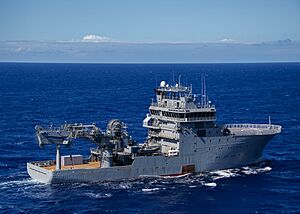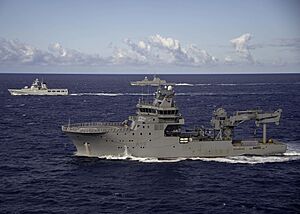HMNZS Manawanui (2019) facts for kids

HMNZS Manawanui during RIMPAC 2020
|
|
Quick facts for kids History |
|
|---|---|
| Name | Edda Fonn |
| Builder | Myklebust Verft AS |
| Launched | 2003 |
| Name | HMNZS Manawanui |
| Cost | NZ$147 million 2018 |
| Sponsored by | Jacinda Ardern |
| Christened | 7 June 2019 |
| Commissioned | 7 June 2019 |
| Homeport | Gisborne |
| Identification |
|
| Fate |
|
| General characteristics | |
| Type |
|
| Displacement | 5,741 tonnes full load |
| Length | 84.7 m (277 ft 11 in) |
| Beam | 18.0 m (59 ft 1 in) |
| Draught | 6.8 m (22 ft 4 in) |
| Propulsion |
|
| Speed | 13 knots (24 km/h) |
| Range | 7,000 nmi (13,000 km) |
| Capacity |
|
| Complement | 39 core crew |
HMNZS Manawanui was a special ship used by the Royal New Zealand Navy. It could do many jobs, like exploring the ocean floor and helping divers. It took the place of two older ships.
This ship started its life in 2003 as MV Edda Fonn. It was bought by the Royal New Zealand Navy in 2018. The ship officially joined the navy as HMNZS Manawanui on June 7, 2019. It began its work in early 2020 and traveled to many places in the Pacific Ocean. Sadly, it sank in October 2024 after getting stuck on rocks in Samoa. All 75 people on board were safe.
Contents
The Ship's Early Life: MV Edda Fonn
The ship was built in 2003 by a company called Myklebust Verft. It was first named MV Edda Fonn. It worked for Østensjø Rederi as a survey vessel. This meant it helped explore the ocean floor for the oil and gas industry.
In August 2018, the Royal New Zealand Navy (RNZN) bought the ship. They paid about $103 million for it. The navy needed a new ship to replace two older ones. These were the HMNZS Resolution, which mapped the ocean, and the HMNZS Manawanui (A09), which helped divers.
New Zealand defense officials looked at 150 different ships. They chose Edda Fonn because it already had the right equipment. It had systems for diving and mapping the ocean floor. The government had first planned to build a brand new ship. However, some money was used to fix other navy ships. So, they decided to buy a used ship instead.
After being changed for navy use, the ship arrived in New Zealand in May 2019. HMNZS Manawanui officially joined the RNZN on June 7, 2019. The Prime Minister at the time, Jacinda Ardern, was the ship's sponsor. This means she helped welcome the ship into the navy.
The navy planned for the ship to serve for 15 years. Manawanui was based at the Devonport Naval Base. Its special home port was Gisborne. The ship's first leader was Lieutenant Commander Andy Mahoney.
After joining the navy, Manawanui had more changes. It was fitted with special equipment for its military role. It started its active service in early 2020. The ship took part in a big military exercise called RIMPAC in Hawaii in mid-2020.
In September 2022, Manawanui helped remove old World War II bombs in Tuvalu. In February 2023, it helped after Cyclone Gabrielle caused damage. In November 2023, it explored the seafloor and removed more World War II bombs. This work was done in Niue, Fiji, and Vanuatu.
On December 9, 2022, Commander Yvonne Gray took charge of Manawanui. Commander Gray used to be an officer in the Royal Navy in the United Kingdom. She moved to New Zealand in 2012. In 2024, the ship went on three trips to the South West Pacific. These trips included visits to the Kermadec Islands, Samoa, Tokelau, and Niue. On its last trip, the ship left Devonport on September 28. It was supposed to return on November 1.
The Sinking of Manawanui
On the evening of October 5, 2024, the ship got stuck on a reef. This happened about 1.8 kilometers (1 nautical mile) off Siumu. Siumu is on the south coast of Upolu island in Samoa. The ship was doing survey work in rough seas and strong winds.
All 75 people on board were safely taken off the ship. They used four of the ship's life rafts and two small rigid hull inflatable boats. This happened early on October 6. Rescue efforts were managed by the New Zealand Rescue Coordination Centre. The Royal New Zealand Air Force sent a P-8A Poseidon aircraft to help.
The evacuation started at 7:52 pm on October 5. Because of the bad weather, it took five hours for the lifeboats to reach the shore. One of the rescue boats even flipped over. Its passengers then walked to shore across the reef.
The ship caught fire by 6:40 am on October 6. It then tipped over and sank by 9:00 am. At least 14 people were hurt in the accident. Many had cuts and scrapes from walking on the reef. Three people needed hospital care, including one with a dislocated shoulder. The crew and passengers were given a place to stay in Samoa. They were then flown back to New Zealand.
The Royal New Zealand Navy is working to recover parts of the ship. They also want to stop any harm to the environment from the sinking. On October 7, people living nearby reported seeing and smelling oil near the wreck.
The reef that the ship was mapping had not been surveyed since 1987. The navy will investigate why the ship sank. This is the first time a New Zealand naval ship has accidentally sunk since World War II. It is also the first to be lost during peacetime.
See also
- RV Tangaroa – NIWA ice-strengthened research ship
 | Lonnie Johnson |
 | Granville Woods |
 | Lewis Howard Latimer |
 | James West |



